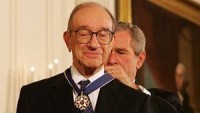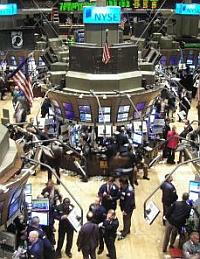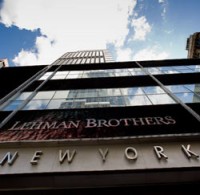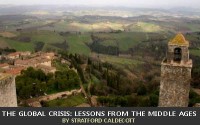Magazine > Business
The Global Crisis: Lessons from the Middle Ages
Opinion > Business
Alan Greenspan, Ayn Rand and the Libertarian God that Failed
 In today’s NY Times, Peter Goodman’s excellent profile of former Federal Reserve Chairman Alan Greenspan confirms what I’ve been writing, that it was a specific “structure of sin”—financial speculation—rather than mere human greed (or bad home loans) that created the credit crisis. I’d always wondered how a rigid anti-government… READ MORE >
In today’s NY Times, Peter Goodman’s excellent profile of former Federal Reserve Chairman Alan Greenspan confirms what I’ve been writing, that it was a specific “structure of sin”—financial speculation—rather than mere human greed (or bad home loans) that created the credit crisis. I’d always wondered how a rigid anti-government… READ MORE >
Opinion > Business
Thinking Catholic: European leaders blame crisis on “speculative capitalism”
 Europe’s financiers were seduced by the lure of easy subprime mortgage profits, just like everyone else, and they’re suffering now, just like everyone else. But give Europe credit for one thing: Thanks to its Catholic roots, Europe’s leaders understand that the financial crisis wasn’t caused by some vague form of “greed”; it was… READ MORE >
Europe’s financiers were seduced by the lure of easy subprime mortgage profits, just like everyone else, and they’re suffering now, just like everyone else. But give Europe credit for one thing: Thanks to its Catholic roots, Europe’s leaders understand that the financial crisis wasn’t caused by some vague form of “greed”; it was… READ MORE >
News > Business
Behind AIG’s Fall, Blind Eye to a Web of Risk
News > Business
The Fleecing of America
Yes, greed fueled the crisis, but Cohen pinpoints what's unique about our penchant for financial manias: "...the U.S. economy is being socialized to the tune of $700 billion ($2,000 for every man, woman and child in the country) as a result of a giant mortgage-related Ponzi scheme... Let’s be clear: this is an American mess forged by the American genius for new-fangled financial instruments in an era where the mantra has been that government is dumb and the markets are smart and risk is non-existent." READ MORE >
News > Business
Greed and ruthless pursuit of profits to blame for banking fiasco
This article gets Catholic social teaching right, and exposes the fallacy that 9/11 restored us to moral clarity: "'Perhaps the most disturbing aspect of Lehman Brothers' fall is that it comes almost seven years to the day after 9/11... For all the talk of pulling together in the wake of the terrorist attacks that shook America to the core and supposedly set our priorities straight, Wall Street rushed headlong back to its mindless pursuit of profits and speculation without consideration for the consequences of its actions... At some point, society has to figure out that the way an investor earns his money is even more important than the amount of money he makes. This is why human beings were vested with moral sentiments, so they could distinguish the quality of human conduct from the quality of its results... It is incumbent upon the gatekeepers of capital ... to bring discipline to the system. This will require a rethinking of their priorities and a willingness to add to their investment calculus, considerations that exceed their own narrow interests about short-term investment returns.'" READ MORE >
News > Business
Ironic Speculation: Investment banks seek protection against short-selling
In an effort to slow panic selling, the SEC will try to force hedge funds to disclose their short selling positions. What's ironic is who's cheering the agency on: "Morgan Stanley and Goldman are the only two of the formerly five major Wall Street brokerages standing alone, and that is believed to have made them targets of speculators... Last week Lehman was the subject of a massive sell-off that eroded confidence in its business and sparked a funding crisis that ultimately led to its demise. 'It's very clear to me we're in the midst of a market controlled by fear and rumors, and short sellers are driving our stock down,' Morgan Stanley CEO John Mack said in a memorandum to employees Wednesday. 'You should know that the management committee and I are taking every step possible to stop this irresponsible action in the market.'" READ MORE >
News > Business
Credit Crunch: What Happens Next?
Opinion > Business
The Church on the financial meltdown: Usury and speculation are to blame
 If there’s anyone in the mainstream media willing to listen to the Church these days (I doubt it), they’ll discover that centuries of Catholic teaching about the sinful practices of usury and financial speculation can explain why Wall Street is tumbling down. (For the best technical explanation, read The Trillion Dollar Meltdown: Easy… READ MORE >
If there’s anyone in the mainstream media willing to listen to the Church these days (I doubt it), they’ll discover that centuries of Catholic teaching about the sinful practices of usury and financial speculation can explain why Wall Street is tumbling down. (For the best technical explanation, read The Trillion Dollar Meltdown: Easy… READ MORE >
News > Business
Why it’s so hard to keep the financial sector caged
“The US itself looks almost like a giant hedge fund. The profits of financial companies jumped from below 5 per cent of total corporate profits, after tax, in 1982 to 41 per cent in 2007, even though their share of corporate value added only rose from 8 to 16 per cent... A financial sector that generates vast rewards for insiders and repeated crises for hundreds of millions of innocent bystanders is, I would argue, politically unacceptable in the long run. Those who want market-led globalization to prosper will recognize that this is its Achilles heel. Effective action must be taken now, before a still bigger global crisis arrives.” READ MORE >
News > Business
Free! Why $0.00 Is the Future of Business
“It took decades to shake off the assumption that computing was supposed to be rationed for the few, and we're only now starting to liberate bandwidth and storage from the same poverty of imagination. But a generation raised on the free Web is coming of age, and they will find entirely new ways to embrace waste, transforming the world in the process. Because free is what you want — and free, increasingly, is what you're going to get.” READ MORE >
News > Business
How business can save the world
“Can businesspeople really be counted on to foster virtue? It's a shaky proposition when profits are at stake. In a 2005 debate in Reason magazine, Whole Foods founder and CEO John Mackey articulated his vision of virtuous, socially responsible business. ‘Human nature isn't just about self-interest,’ Mackey wrote, paraphrasing Adam Smith. ‘It also includes sympathy, empathy, friendship, love, and the desire for social approval. As motives for human behavior, these are at least as important as self-interest. For many people, they are more important.’" READ MORE >
News > Business
Too many stores: How long will the anti-shopping backlash last?
“The extreme consumption of this current gilded age has inspired a backlash. In December, hedge-fund billionaire Ray Dalio ran full-page advertisements in newspapers urging Americans to eschew Christmas gifts and instead make donations to charity. Maybe he's just run out of things to buy. Or maybe he's surfing the zeitgeist… [but] the cultural anti-retail moment will likely pass. Thoreau lasted only 26 months in his cabin by Walden Pond. The elevation of frugality into a virtue seems likely to last about as long as modern recessions do—about eight months.” READ MORE >
Page 1 of 1 pages








